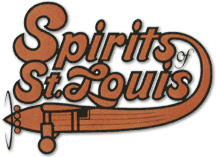
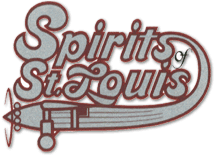
  |
Spirits of St. LouisYears of existence: 1974-75 through 1975-76
|
ESPN's "30 for 30" documentary series has touched on many sports stories and topics, but never the ABA - until now. Catch "Free Spirits" on the ESPN flagship network this coming Tuesday, October 8, 2013 at 8PM ET.
Free Spirits tells the story of the Spirits - from the emergence and antics of all-star Marvin Barnes, to their rookie radio play-by-play announcer Bob Costas, the team's incredible 1975 playoff upset of the defending champion New York Nets, and the unbelievable financial deal that the Spirits' owners made at the time of the ABA/NBA merger in June 1976 (otherwise known as the "Best Deal in Sports"). Eight-time Emmy winner Dan Forer produced and directed the feature. He scoured the archives for Spirits video footage, photos, and period interviews, many of which have never been seen before. If you miss the premiere of Free Spirits on October 8, the feature will be available for download on iTunes on October 9, will be released on Blu-Ray/DVD later this year, and will be replayed on various ESPN channels in the future.
Back to "Remember the ABA" Main Page
Did you see a Spirits game? Or, did you have a favorite Spirits player? Contribute to this web page by
The Spirits of St. Louis might well have been named the "Free Spirits" of St. Louis -- this was a unique, unpredictable team blessed with a wealth of young talent. The Spirits were born in the summer of 1974 after the owners of the Carolina Cougars sold the franchise to several New York businessmen.
The new owners promptly moved the team to St. Louis. The new logo (pictured above) was clever, and the Spirits' uniforms were classy. The Spirits played their home games in the 18,000 seat St. Louis Arena (also known as the "Checkerdome"). Their rookie radio announcer on KMOX 1120 AM was Bob Costas (current NBC sports anchor).
The Spirits kept only a few former Cougars (including talented veterans Joe Caldwell and Steve "Snapper" Jones). In reality, the Spirits were no different than an expansion team. Fortunately, though, the Spirits had a knack for signing and keeping promising young players.
Out of Providence College, precocious rookie Marvin Barnes (below, #24) had a huge (if not tumultuous) year for the Spirits in 1974-75, averaging double figures in scoring (24.0 ppg) and rebounding (15.6 rpg). A month into the season, after teasing Spirits fans with his spectacular play, Barnes suddenly left the team. His location was a complete mystery, and the Spirits were forced to play on without him. After a few days in the dark, the Spirits front office finally learned that Barnes was in Dayton, Ohio (at a pool tournament!) with his agent. Marvin was unhappy with his contract and had bolted the team in order to get his point across. Fortunately for all parties involved, Spirits management persuaded Marvin to return to St. Louis and rejoin the team.
Early in Barnes' rookie year with St. Louis, he bolted the Spirits for parts unknown and attempted to renegotiate his contract. Eventually, he was found (along with his agent) in a smoky pool hall in Dayton, Ohio. Streaming RealAudio File - RealPlayer plug-in required |
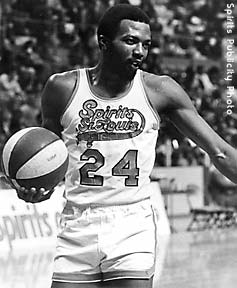 |
While Barnes continued his torrid play upon his return (going for over 50 points in several games, and playing in the 1975 ABA All-Star Game in San Antonio), the incident spelled the end of Joe Caldwell's tenure with the Cougars/Spirits franchise. It was thought by the Spirits front office that Caldwell had encouraged Barnes to walk out on the team. Caldwell was suspended for what the team described as "failure to conduct himself in a manner consistent with his contractual obligation to the Spirits," and never played another game for St. Louis.
Another high-impact Spirits rookie was Maurice Lucas from Marquette. Lucas surprised everyone with his tenacity on the boards, and a deadly mid-range jump shot. Other 1974-75 Spirits were Gus Gerard (a third rookie), Fly Williams (a fourth rookie), Goo Kennedy (a former Dallas Chaparral), Don Adams (a former Detroit Piston, acquired at mid-season), Freddie Lewis (a veteran guard acquired from the Memphis Sounds), Mike Barr (a former Virginia Squire) and Steve "Snapper" Jones (an ex-Cougar holdout and a badly-needed stabling influence for the team). The coach of the Spirits in their first year was Bob MacKinnon.
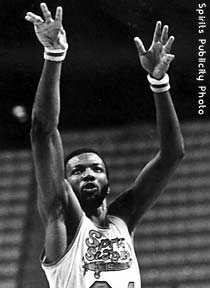 |
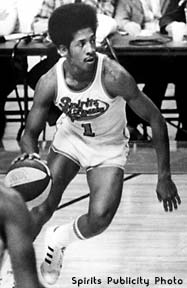 |
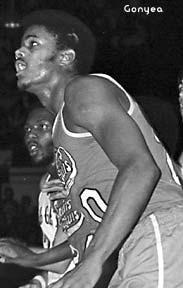 |
| The 1974-75 Spirits of St. Louis were anything but predictable.
Marvin Barnes (above left) overcame his early-season disappearance, missed practices, a fast food diet and numerous late-night parties to average 24.0 ppg, grab 1,202 rebounds, and win the 1974-75 ABA Rookie of the Year award. Early in the season, the Spirits solved their problems at the point guard position by trading center Tom Owens to the Memphis Sounds for Freddie Lewis (above middle, # 1). Lewis regained his all-pro form in St. Louis. Along with Barnes, he represented the Spirits at the 1975 ABA All-Star game in San Antonio (winning the game's MVP Award with a 26 point performance). You never knew what rookie guard Fly Williams (right, #35) would do on the court. A fan favorite, Fly averaged 9.4 points and 2.0 assists per game for St. Louis. Some nights Fly was hot, and some nights he was most certainly not. On the other hand, Maurice Lucas (above right) turned in a strong and consistent rookie year, averaging 10 rebounds per game, and 13.2 points per game. Out of all the talented Spirit players, Lucas had the most productive and long-lasting NBA career, finally retiring after the 1987-88 season. |
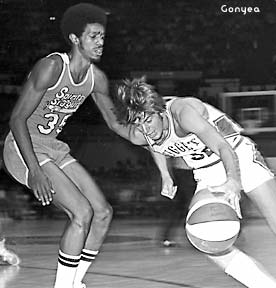 |
The Spirits played poorly most of their first season, winning only 32 games. Attendance was sparse. But by the time the playoffs rolled around, the talented Spirits rookies (Barnes, Lucas and Gerard) had learned to play with the steady Spirits veterans (Lewis, Jones and Barr). In the first round of the 1975 ABA Playoffs, the lowly Spirits shocked the defending ABA Champion New York Nets four games to one. It was one of the most astounding upsets in the history of professional basketball, considering the following facts: (1) the Nets had finished 26 games ahead of the Spirits in the regular season; (2) the Nets had won all eleven regular season games against the Spirits; and (3) the Nets had Julius Erving.
The Spirits clinched the series with the Nets in memorable fashion. With the Spirits leading the series 3 games to 1, Game 5 was played at Nassau Coliseum in New York. Late in the fourth quarter, it appeared as if the Nets would certainly win and force a Game 6 back in St. Louis. With only 20 seconds left, the Nets were ahead by one point and also had possession of the ball. The Nets had to throw the ball in from midcourt. The inbounds pass went to Erving, who came under intense defensive pressure from Don Adams. Amazingly, Erving dribbled the ball off his leg and into the back court. The referees immediately called a backcourt violation, and gave the ball to the Spirits. Down by one point, the Spirits inbounded the ball to Freddie Lewis. Lewis dribbled to the top of the key and, with only three seconds left, swished a jumper to win the game (and the series) for St. Louis.
In the second round of the 1975 Playoffs, the Spirits faced Hubie Brown's powerful Kentucky Colonels. While the Spirits had finished 26 games behind the Colonels in the regular season, the Spirits had gained momentum and confidence from their shocking upset of the Nets. If St. Louis could beat the Nets, then why not the Colonels as well?
|
Kentucky had the ball and a chance to go ahead. But with twenty seconds left, Ted McClain missed a wide open jumper, and Don Adams grabbed the rebound for St. Louis. Leading by one point, and with the 30-second shot clock turned off, all the Spirits had to do was run out the clock or wait for an intentional foul. Incredibly, though, Louie Dampier stole the ball from Steve Jones and banked a quick jumper to steal the victory for Kentucky.
St. Louis played well the rest of the series, but an ankle injury to Freddie Lewis severely hindered the Spirits' chances. The Colonels prevailed four games to one and advanced to the ABA Finals.
The Spirits' second season was a disappointment considering their 1975 Playoff success. New players included Don Chaney (lured away from the Boston Celtics), and rookie M.L. Carr (a future player and coach with the Boston Celtics). Also, after the Utah Stars folded in December 1975, the Spirits obtained all-stars Moses Malone and Ron Boone, plus Steve Green and Randy Denton. In the middle of this last season, the Spirits traded Maurice Lucas to Kentucky for center Caldwell Jones. In short, the Spirits' roster was stocked with players who would go on to have significant and productive careers in the NBA.
But even with all of the obvious talent, St. Louis struggled through the 1975-76 season. Barnes was forced to miss several games because he was involved in litigation. A former Providence College teammate sued Barnes and claimed that Marvin had struck him in the head with a tire iron. Malone came to the Spirits in December with a broken foot and with a demand to renegotiate his contract. He eventually played for St. Louis, but not until halfway through the season. The Spirits missed Lucas and Gus Gerard (sold to the Nuggets in December to make room for the Utah players).
Amidst all of this tumult, attendance plummeted. For games against lesser teams like Virginia, it was not uncommon to see only 400 to 500 fans in the cavernous St. Louis Arena. In 1976, attendance hovered around 800 to 1,000 fans per game even for teams like Kentucky (defending ABA Champions), New York (with Dr. J) and Denver (with rookie sensation David Thompson).
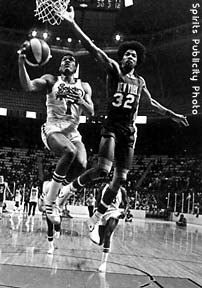 |
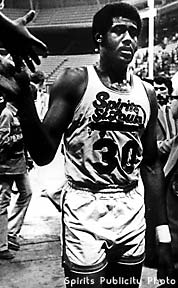 |
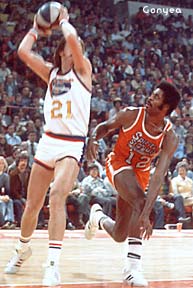 |
| The 1975-76 season brought a lot of change and instability to the Spirits franchise.
Don Chaney (above right, #12) came on board for the 1975-76 season from the Boston Celtics, but only played in 48 games. After having played the previous seven seasons with the disciplined and methodical Celtics, Chaney found the Spirits' style of play frustrating and incomprehensible. Future Hall-of-Famer Moses Malone (right, #13) came to St. Louis from the defunct Utah Stars. Malone showed glimmers of dominance, but missed 41 games due to a broken foot. Ron Boone (above left, #1, floating in the air with Julius Erving) also came to the Spirits from Utah. Boone didn't disappoint. He provided his usual dunks, hustle, and double-figure scoring. Along with Barnes, Boone represented the Spirits at the 1976 All-Star Game in Denver (scoring 10 points in 16 minutes). Another of the few bright spots was rookie guard/forward M.L. Carr (above middle, # 30). After being one of the last cuts in the 1973 Kentucky Colonels training camp, Carr stuck with the Spirits and made his presence known. Carr was named to the ABA All-Rookie team. In the 1980's Carr became known to a wider national audience as a member of several Boston Celtics championship teams. |
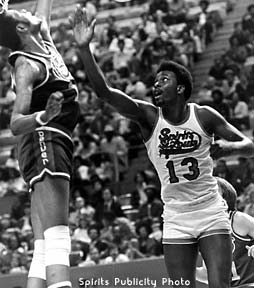 |
Late during the 1975-76 season, the Spirits made a run at Indiana for the last spot in the ABA Playoffs. But the Spirits finished with only 35 wins, 4 games behind the playoff-bound Pacers.
Interestingly, if the ABA had lived one more season, plans were in place to move the Spirits to Salt Lake City, where they would have become the "Utah Rockies." Instead, the Spirits died during the June 1976 merger negotiations with the NBA.
After it became apparent that the NBA would only allow four ABA teams to join the NBA, St. Louis owners Ozzie and Dan Silna reached a famous agreement with the other remaining ABA owners. In return for folding their team, the Spirits' owners obtained the right to 1/7 of any future television money received by the surviving ABA teams (Denver, Indiana, New York and San Antonio) -- in perpetuity. In the late 1970's, the NBA's contract with CBS was modest in scope. But as the NBA's popularity exploded in the 1980's and 1990's, the league's television rights were sold to CBS (and then NBC), plus the TNT and TBS cable networks, for hundreds of millions of dollars. Over the past 25 years, the Silnas have collected approximately $100 million from the NBA, despite the fact that the Spirits never played an NBA game. The Silnas continue to receive checks from the NBA on a yearly basis, representing a 4/7 share of the television money that would normally go to any NBA franchise.
Spirits 1974-76 Home Uniform |
 Spirits 1974-76 Road Uniform |
1974-75 Season
Record: 32-52, Third Place in Eastern Division
1975 Playoff Results:Eastern Division Semifinals vs. New York Nets (58-26)
Spirits won series, 4-1Eastern Division Finals vs. Kentucky Colonels (58-26)
Colonels won series, 4-1
Record: 35-49, Sixth Place
Missed Playoffs